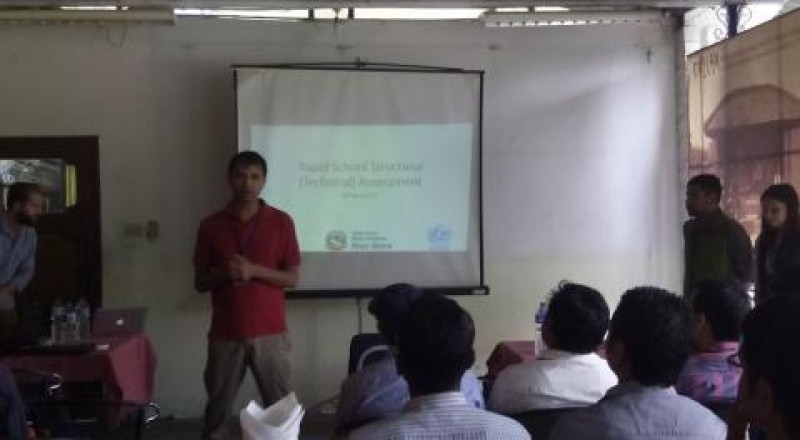In order to assess the infrastructure of school buildings in hard hit districts and find out whether schools are safe or unsafe to reopen, Ministry of Education (MoE) with the support of UNICEF and Health Research and Social Development Forum (HERD) is all set to begin assessing the structural damage in school buildings. HERD has been contracted to manage the overall assessment process including collecting data from the various schools.
The assessment will be carried out at 11 districts. “In the first phase, the assessment team will be mobilised at Nuwakot, Kavre and Dhading from May 20. Total number of schools in Nuwakot is 722, Kavre 712 and Dhading 665. The second and third phase will be carried out at 4 districts each which will be finalised shortly", Sudeepa Khanal, project focal person from HERD informed. An orientation session about the project was organised at Sap Falcha, Babarmahal, Kathmandu on Monday, May 18 with 60 participants who are being deployed to the field.
Speaking at the session, Executive Director at HERD, Dr. Sushil Chandra Baral stated assessment as an opportunity as it won’t just be monitoring schools but will also be contributing to the locals psychologically. Appreciating the efforts of the participants he said, “We have already realised that sitting quietly is not fine, we can’t always remain in pain. We have lost our smiles but we need to overcome the fear as the life has to move on.”

Dr. Baral during the introductory session talking about the purpose of the project
The team will be closely observing the infrastructure of the schools and then after assessing their condition, MOE, UNICEF, HERD as well as other stakeholders will then take appropriate steps. The team will first coordinate with the District Education Office and the assessment will be done together in a team comprising of official from Department of Education (DoE), engineers and enumerators.
Data will be collected by using electronic device (tablet PC) and a paper backup will also be maintained. A backup copy of the filled electronic form will be maintained on the tablet by the application. The data submitted from the tablet to the server (via the internet) will be monitored via the Kobo web application. It will be ensured that all data sent to from the tablet is received at the server.

Enumerators during the e-data collection practice session using tablet PCs
The tablets will be used for data collection in a close collaboration with the DoE. Landon Newby of the Education Cluster said, “We have been very lucky to get this type of exposure”. “We have developed an application called Kobo Collect from a paper form (tool). We sat with UNICEF and the team to develop a mobile form to be used for data collection through tablets. We along with HERD team developed the tool, downloaded the application and placed into the tablets. Now, we are conducting the training, so let’s see how the data collection goes” Newby added.
Communications desk at HERD will contact the team and take updates of the field on a daily basis. A final report of the assessment will be provided to UNICEF. HERD will provide a final report on the findings of the assessment, its processes and qualitative interactions in close co-ordination with the district officials.
Bimal Thapa of National Society for Earthquake Technology (NSET) - Nepal suggested the participants to be very careful while examining the buildings. He suggested them not to enter any building (even with minor cracks) alone. He informed, “Only two flags will be used - green and red. We need to figure out whether the buildings are either safe or unsafe”. Likewise, Kishore Bhattarai from Fire Department of Kathmandu Metropolitan City (KMC) talked about the preventive measures one should adopt during the time of earthquake. He advised the participants with tips on protecting oneself on the time of danger while on field.

Bimal Thapa from NSET-Nepal during his session on infrastructure assessment
Arjun Shiwakoti, one of the enumerators opined that this is an opportunity to do something for the nation. He said, “It’s not the time to sit and wait for others to take a step, it is us who have to make the move and I am glad that I got the opportunity”. He said, “It is very obvious for families to be worried as we will be away for a long time, but we have to be confident and learn to walk with the fear.”

Contributors: Dr. Sushil Baral, Sudeep Uprety and Kritagya Regmi



Comments(0)
No comments found.